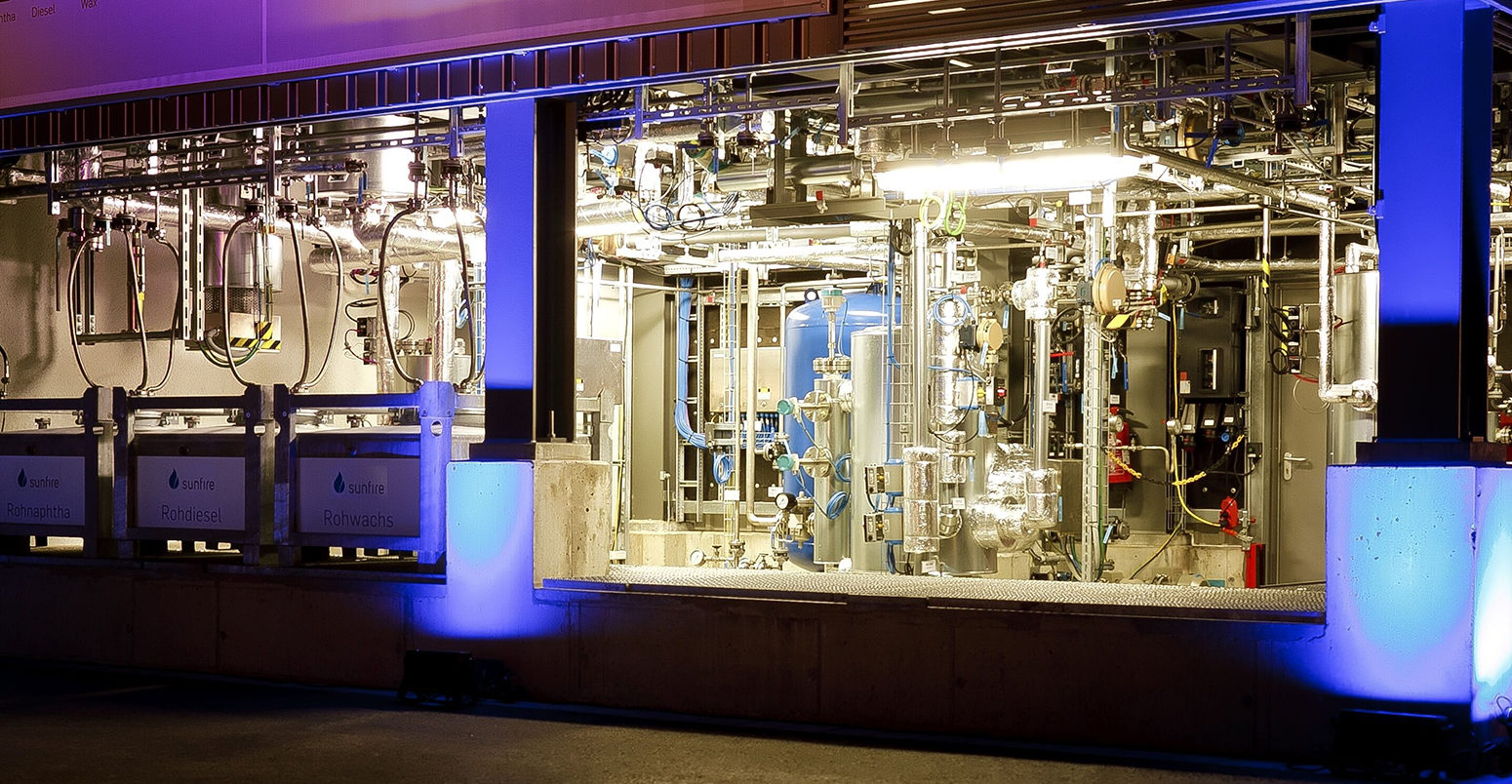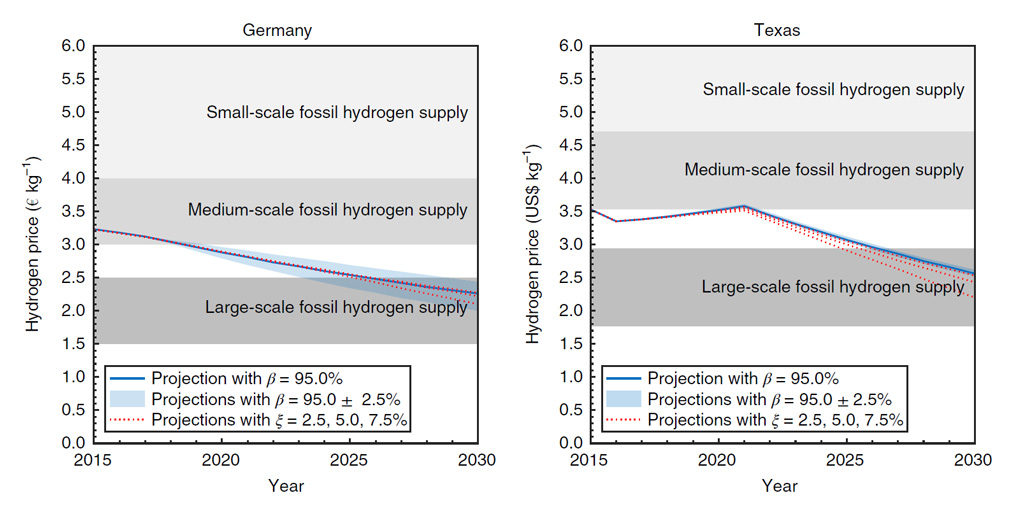RENEWABLES
25 February 2019
Renewable hydrogen ‘already cost competitive’, say researchers

Electrolysis facility. Credit: Sunfire GmbH, Dresden/renedeutscher.de
RENEWABLES
25 February 2019 16:00
Renewable hydrogen ‘already cost competitive’, say researchers

JOCELYN TIMPERLEY25.02.2019 | 4:00pm
RENEWABLESRenewable hydrogen ‘already cost competitive’, say researchers
Hydrogen produced using renewable electricity is “already cost competitive” in niche applications, a new paper says, adding that it is likely to match industrial-scale alternatives in about a decade.
The research, published today in Nature Energy, contrasts with other work on renewable hydrogen, which has found it would be prohibitively expensive compared to the alternatives.
The study shows that policymakers “should not ignore hydrogen” in the discussion on how to move to a renewable energy system, the lead author tells Carbon Brief.
Low-carbon hydrogen
Hydrogen is seen as a potentially important low-carbon replacement for natural gas (predominantly methane) in the energy system, alongside the roll-out of renewable electricity.
It could be used to reduce emissions from industrial processes that need gas to create high temperatures, such as steel production. Or it could replace natural gas in homes already connected to the gas grid, with some modifications to boilers, pipes and hobs.
For high-latitude countries, such as the UK, where gas use peaks during the cold winter months, seasonal energy storage would also be needed to complement a highly renewable energy system. Low-carbon hydrogen offers one solution for this problem, too.
There are two main ways to make low-carbon hydrogen. The first builds on existing production methods where natural gas is “reformed” into hydrogen and CO2. Adding carbon capture and storage (CCS) means this CO2 would not be released to the atmosphere, though this is unlikely to avoid 100% of emissions.
The second route is via electrolysis of water using low-carbon electricity. However, this is currently thought to be a more costly alternative than the fossil-fuel-with-CCS route. (Other possible ways of producing hydrogen, such as “thermochemical water splitting” and artificial photosynthesis, are at earlier stages of development).
Many energy experts remain sceptical that large-scale renewable hydrogen will ever be viable at a low cost.
The potential for using renewable hydrogen in the UK is “limited” due to its low efficiency, the UK government’s climate advisors, the Committee on Climate Change(CCC), recently concluded. Only a “selective” rollout of hydrogen produced from gas with CCS had a potentially important role in cutting emissions, it said.
Falling costs
Today’s paper challenges this view. It finds that hydrogen produced using wind power in Germany and Texas is already cost-competitive for small- and medium-scale users of the gas, who generally pay more for the material.
It adds that renewable hydrogen will become competitive with current large-scale industrial supplies from fossil fuels in the next decade or so. This is due to the falling cost of wind energy and the electrolyser technologies used to convert it to hydrogen, it says.
The overall cost reduction is shown in the chart below. Renewable hydrogen is currently economically viable – meaning it could, in some cases, provide a higher return to investors than investing in a renewable power plant without hydrogen – if it is sold for at least $3.23 per kilogramme (kg) in Germany and $3.53/kg in Texas, according to the paper.

Calculated “break-even price” of renewable hydrogen for Germany (left) and Texas (right) compared to benchmark prices for hydrogen supply from fossil fuels not using CCS. For Germany, this assumes a waiving of the requirement for subsidies that renewable electricity be fed into the grid. The peak in 2020 for Texas is due to a phasing out of the production tax credit (PTC), a fixed credit per kWh of produced electricity. Source: Glenk & Reichelstein (2019).
It should be even more favourable to produce renewable hydrogen in the UK than in Germany, says Gunther Glenk, doctoral candidate at the Technical University of Munich(TUM) and lead author of the paper. This is because the UK is windier than Germany. He tells Carbon Brief:
“Basically, the higher the wind intensity, the cheaper the cost of obtaining electricity from wind. And that is an important factor in the whole equation.”
It is worth noting that these results show renewable hydrogen is competitive with fossil-fuel hydrogen production, even when the latter does not include CCS. Glenk says:
“CCS is another major cost barrier for hydrogen produced from fossil fuels. So I just don’t see the case for it.”
However, the paper’s assumptions may not be directly transferable to the UK situation, says Dr Daniel Scamman, senior research associate at University College London’s Energy Institute, who was not involved in the study. He tells Carbon Brief:
“Their costs are lower than in some other studies as they assume the wind turbines qualify for a production subsidy, that the electroyser can be shrunk to increase utilisation and that the plant benefits to some extent from off-peak prices. These assumptions may not be applicable in all situations and their results may not be directly transferable to the UK.”
Economically viable?
There are several reasons why the paper reaches a favourable conclusion for hydrogen produced from renewables.
First, it finds recent improvements in electrolysers – the technology used to convert electricity and water to hydrogen – mean costs have fallen substantially. The paper performed a cost review of electrolyser technologies from a wide variety of sources, including manufacturers, plant operators, scientific journal articles and other reports.
The efficiency of the conversion from hydrogen to electricity has also improved, Glenk says.
Second, the study bases its results on plants with the “optimal capacity size” of both the renewable source and the accompanying power-to-gas electrolysis facility, says Glenk.
For example, if a wind turbine on average produces only around 30% of its peak power output, any power-to-gas facility built alongside it should use at most this amount of power: any larger would be a waste of money.
The extent to which electricity prices fluctuate also needs to be take into account when deciding how large – and, thus, how expensive – a power-to-gas facility should be, Glenk adds.
Facilities can now be operated in near-real time, allowing them to optimise the system by giving them more control over whether to sell electricity to the grid or use it to produce hydrogen, he adds. He tells Carbon Brief:
“I’ve actually never seen both optimisations in real-time operation and in capacity sizes in any other study.”
Third, the paper assumes that wind energy will get much cheaper over time. It assumes the price of buying new wind turbines falls by 4% per year, roughly halving between now and 2030. It also assumes their capacity factor – the actual electricity produced compared to the maximum possible – increases by 0.7% per year.
All this means the “levelised cost of electricity” from wind in Germany would fall from €54 per megawatt hour (MWh) today to €33/MWh in 2030, with similar reductions for Texas.
Another recent academic review of the role of hydrogen in a low-carbon economy – on which Scamman was one of the authors – concluded that falling electrolysis costs and altered national regulatory frameworks could render power-to-gas profitable within 10 to 15 years.
In contrast, the CCC report argued wind generation would need to fall to less than £10/MWh for renewable hydrogen to be competitive with the fossil-fuel-plus-CCS alternative. It said renewable hydrogen might be competitive in countries where solar power is very cheap.
Cheaper than thought
This view of hydrogen costs, along with other factors, led the CCC to recommend a cautious and “selective” approach to using the fuel. Yet today’s findings suggest renewable hydrogen could be much cheaper than previously thought. Scamman tells Carbon Brief:
“This study is part of a growing body of literature arguing that the falling cost of renewables combined with the significant cost reduction potential of power-to-gas technology could lead to much cheaper electrolytic hydrogen production than many have previously thought…
“In their report, the CCC expressed concern that there would be enough low-cost, low-emission hydrogen to make much of a contribution to the UK’s decarbonisation effort. This study helps build the argument that substantial reductions in the cost of electrolytic hydrogen are possible and that hydrogen could end up playing a bigger role in a low-carbon UK energy system than many currently think.”
But cost is not the only reason some are cautious about hydrogen, Scamman notes. There is also a limit to the amount of renewable capacity that can be built in the time available to meet the UK’s climate goals. He also points to the energy losses during the electrolytic conversion process, as well as doubts over how quickly an international market in low-carbon hydrogen might develop.
“This paper helps address the first concern, but not the others. Efficiency losses do mean that renewable electricity should be used as electricity where possible,” Scamman says. “However it’s cheaper to store bulk hydrogen than electricity – particularly for seasonal storage – and hydrogen may be required to decarbonise some sectors including heavy-duty transport and industry where electricity is less suitable. History has shown that renewable deployment can occur faster than some expect. Likewise for the development of international markets.”
As the CCC hydrogen report notes, large-scale production of hydrogen from electrolysis in the UK would imply “extremely challenging” build-rates for low-carbon capacity by 2050.
Policy outcomes
The new findings show that policymakers “should not ignore hydrogen” when considering how to move to a renewable energy system, says Glenk.
“It’s already competitive today if you do the calculations right, and it will become even more so even before 2030,” he says.
However, in some countries, systems which support the uptake of renewables will need to be adapted to ensure renewable hydrogen is also credited, says Glenk. Policymakers could also consider bringing in specific subsidies to accelerate the transition to hydrogen, he adds.
Hydrogen is “the single most important remaining question in the energy transition”, energy commentator Chris Goodall tells Carbon Brief in response to the paper. He adds:
“Cost competitive hydrogen from renewables makes full decarbonisation possible through power-to-gas and power-to-liquids.”
Sharelines from this story
Link: https://www.carbonbrief.org/renewable-hydrogen-already-cost-competative-say-researchers?utm_content=bufferea42b&utm_medium=social&utm_source=twitter.com&utm_campaign=buffer

No comments:
Post a Comment